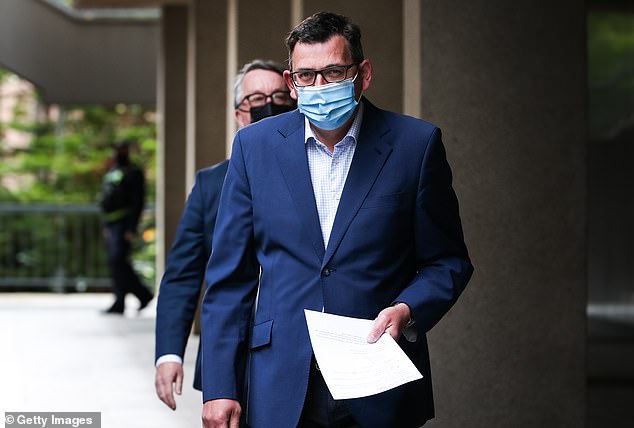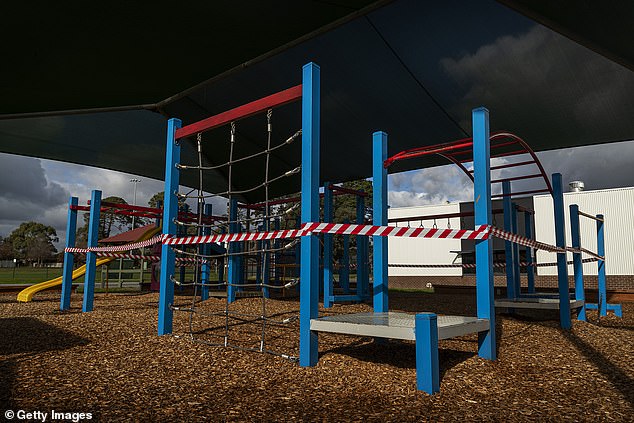Dr Nick Coatsworth exposes the major problem with Australia’s pandemic response
Top doctor Nick Coatsworth said the tough lockdowns and school closures in the era of the Covid pandemic were not “evidence-based” as he also took a cheeky swipe at former Victorian Premier Dan Andrews.
Dr. Coatsworth, who served as deputy chief medical officer during the pandemic, was responding to the Covid-19 Response Inquiry Report released on Tuesday, which found heavy-handed measures caused Australians to lose confidence in health authorities.
He said that while the report’s remit was to focus on federal action, it contained “a very strong message for state premiers.”
“It’s: ‘You have to base your decisions on facts as much as the federal government does,’” he told Daily Mail Australia on Tuesday.
‘Everything from including playgrounds that were closed in Melbourne to telling people they’re going to catch Covid at the MCG, none of that was particularly evidence-based but persisted for a very long time into 2021.
“I’m terribly sorry to say it, but if you’re in Victoria you need to do some research into the support given to that policy.”
The research report, authored by Robyn Kruk, Professor Catherine Bennett and Dr Angela Jackson, said ‘state’mThe measures under the Biosecurity Act were restrictive.”
“Their wider impacts on economic, social and mental health and human rights were not always understood or considered,” the report said.
Leading Australian doctor Nick Coatsworth said those fired for refusing Covid vaccines were owed an apology if governments regained the trust lost during the pandemic.
‘The response to the pandemic should have shifted from a reliance on the ‘better safe than sorry’ precautionary principle… to a risk-based approach, based on evidence.’
The report found that while Australia’s National Cabinet Headquarters Health Protection Committee “did not recommend school closures during the pandemic”, this did happen, especially in Victoria where children were sent home for months.
This contributed to a devastating effect on young people’s mental health, with one study finding that more than 50 percent of children in Victoria reported symptoms of depression and 25 percent reported symptoms of anxiety.
“There were higher risks for students with pre-existing mental health problems, but 20 percent were experiencing mental health problems for the first time,” the report said, noting spikes in self-harm, especially among teenage girls, as well as eating disorders.
This brought Dr. Coatsworth to question Mr Andrews’ recent appointment as chairman of the youth mental health non-profit organization Orygen.
“If you were the board of Orygen, you certainly should have known these statistics and thought twice about appointing the person responsible,” he said.
Dr. Coatsworth told Channel Nine’s Today program on Wednesday that he thought those who lost their jobs because they refused Covid vaccines were owed an apology.
“When we, I’m looking at myself here because I was part of this apparatus, were pushing vaccine mandates and people were losing their jobs because they didn’t take the vaccine, it really eroded trust,” Dr. Coatsworth said.
“And I think if there’s one thing we can take away from this very long report — and, you know, I think I did it on this show — is that we should apologize to the people who lost their jobs due to vaccine mandates.

Dr. Coatsworth was particularly scathing about the long-term draconian measures taken by Victoria and then Prime Minister Dan Andrews (pictured)
“If we start doing that, and if maybe more people than just me say that, we can start on the path to rebuilding trust among those people who may no longer even have confidence in our childhood vaccination program.”
The research report also found an increase in domestic violence during the pandemic.
“A significant number of women and children experienced violence for the first time, and… there was also an increase in the severity of violence during the pandemic,” the report said.
Unfortunately, this wasn’t a surprise, Dr. Coatsworth said.
“I remember this being discussed in the media when schools closed, about those for whom home is not a safe place,” he said.
“If someone gets locked up, or if the police force you to stay in your own home, you better have a way to help those people.
“That was not a surprising outcome, people knew at the time that this would be a outcome.”
Dr. Coatsworth said that while the ‘effectiveness of the two-course vaccine against Covid-19 has been astonishing’, those harmed by the jabs have been poorly treated, often by dismissive doctors.
“This speaks to the issue of trust: can we rebuild the trust of Australians that no matter how we do it, the messaging doesn’t make people feel like they’re being gaslit, or that their doctors are afraid of their registration or that their doctor just doesn’t listen? for them,” he said.

Dr. Coatworth noted that the masking off of playgrounds and closure of schools during the pandemic was not particularly ‘evidence-based’
‘How are we going to do that and restore trust? The damage compensation schemes were inadequate.’
Dr. Coatsworth admitted it would be difficult to secure vaccine mandates ever again.
“If we ever implement mandates again, they can be shifted and changed based on the evidence,” he said.
“The immediate question is what we can do to regain the confidence of a relatively small but important percentage of people who have lost confidence in our vaccine programme.”
As someone at the heart of Australia’s Covid response, Dr Coatsworth said the report had given him no reason for regret.
“It didn’t make me think at all,” he said.
“What it has done reinforces some of the things I have been saying publicly since mid-2021.
‘It is important that we do not see the report as a check or cross against decisions. It’s a great blueprint to regain trust and do better next time.”
Dr. Coatsworth said those opposed to long-term draconian measures, including himself at times, were too easily drowned out.
“This report calls for open debate and transparent evidence gathering,” he said.
“We need to start not shouting and ridiculing the people who are starting to wonder what we are doing.
“Let’s not cast aspersions on people who have a different view of how we should do things.”
